#Thematic Themes
Explore tagged Tumblr posts
Note
correct me if i’m wrong cos i don’t watch dune.. but i’ve seen people call paul a tragic character. except isn’t he a whole white coloniser tricking indigenous poc into believing he’s a prophet to serve his own interests? that’s inherently evil that cannot be a tragic character imo
so yes that is correct that is what happens. the tragedy is that he is a sixteen year old boy who gets a vision of this happening and he is TERRIFIED and absolutely does not want this to happen at all. He does not want the holy war he does not want to be the chosen one he initially very much wants to fight alongside the fremen as equals trying to liberate themselves from their current colonizer without becoming the messiah because they have common political cause.
And then the entire second half of the first book (and the second movie) are about the concessions he makes to himself bit by bit by bit (well it’s the only way to save his mom and sister. well it’s the only way to prevent nuclear war. well he does want his revenge. well maybe he IS special.) Until by the end he has lost 100% of his humanity, fully wants to be the messiah and is willing to manipulate people into thinking so, and has declared himself duke of arrakis in his father’s name and made a play for the imperial throne.
you’re right that it’s evil. the book and these movies agree with you. the tragedy is watching a child who desperately wanted to avoid this slowly completely lose himself to it anyways. i don’t think “tragic” and “evil” are inherently mutually exclusive.
#so dune is thematically complicated. because it IS very much anti white savior and anti colonial.#but the author white american weirdo that he is is still throwing a lot of orientalism out while communicating those themes#dune
8K notes
·
View notes
Text
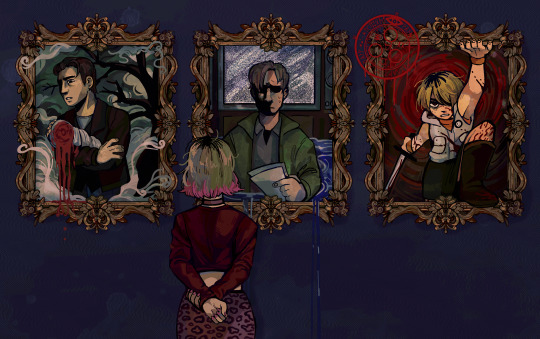
galleria
speedpaint under cut
youtube
#erm (shy). the theme i was going for was boundary breaking. also just rly wanted to draw sth for the trilogy..love these games#harry mason#heather mason#cheryl mason#james sunderland#maria silent hill#silent hill#silent hill 1#silent hill 2#silent hill 3#blood cw#and before anyone gets any ideas the water in the james pic is just because i thought itd look cool thematically#i dont consider that one the true ending so#;drawn#fanart#Youtube
3K notes
·
View notes
Text
I could wax poetic about why Viktor's League backstory is inherently more interesting and more thematically resonant than where they went with him in Arcane season 2, but the cold hard truth is
a man covered in grease and probably blood who builds his own body out of scraps with his own two hands, can in fact build any contraption out of dinted metal sheets and a few screws including a deathray, performs deeply inadvisable operations on desperate but consenting people with his own tools, generates a cult following against his wishes because of his ability to inadvisably help people but the power's all his now anyway so he may as well, wants to clean up and save the undercity but is (only sort of) misunderstood as a walking Geneva Convention violation a freak and a supervillain, torments his arch-nemesis on at least a weekly basis and probably homoerotically hunts him for sport, had his life's work misattributed to people in the ruling class and is angry and tragic about it forever, tries to rip out his own emotions and is unsuccessful but pretends like he was not, is actually oddly kind to children, and is at the end of the day still just some guy,
is just hotter okay
#arcane#viktor#viktor arcane#machine herald#arcane critical#viktor the machine herald#and yes it IS more interesting and more thematically resonant and doesn't unnecessarily launch the story's stakes into orbit#as usual i'm mashing his 2011 and 2016 lore together but that seems the natural course these days because there's good in both#the conversation around viktor's league changes is unfortunately mostly about appearances from what i can tell when really#the issue is themes and story and what is ACTUALLY cooler and more interesting as character writing#and not just -bigger stakes are automatically better- because they are really really not
863 notes
·
View notes
Text
i dont think i will ever be over dragon age 2. like. bioware made an epic fantasy story about a chosen one having to save a country and stop the apocalypse and then they made the second installment of the series be about the sociopolitical climate in ONE city through the lens of a family of refugees fleeing from the war of the first game and just. made it about political tensions and class dynamics and the influences of living in a church-mandated state and the growing tension over an occupied piece of the city and political killings and interpersonal conflict and power and its story is ENTIRELY character-driven. it has easily the most iconic set of companion characters. the premise of living through a story told over the course of ten years and knowing from the start that something really bad will happen in the end was so fresh and exciting. the fact that the acts really built on top of each other andhow much the city changed over time. and the game was so mature in terms of the topic of fighting against oppression in so many ways (im usually generous and say that the short development time left some things a bit wanting), and as much as some people say that the game treats mages and templars as being equally bad, i don't think that that is actually true about the game and it very earnestly tries to grapple with some pretty complex political dynamics.
and then the game completely flopped financially and was almost universally hated for its queer themes and its sympathy for "terrorism" and a lot of the things that stemmed from basically having no production time at all and then the studio just made another epic fantasy story about a chosen one that has to save the world from the apocalypse
#myposts#da#dragon age#i feel like. dragon age origins is dark fantasy. dragon age 2 is a political thriller that is at times too really dark#and dragon age inquisition is a fantasy game with a moral complexity suitable for 10-year-olds#whose themes are all over the place and that has zero thematic coherence or any real vision for what the fuck they are doing with the story
4K notes
·
View notes
Text
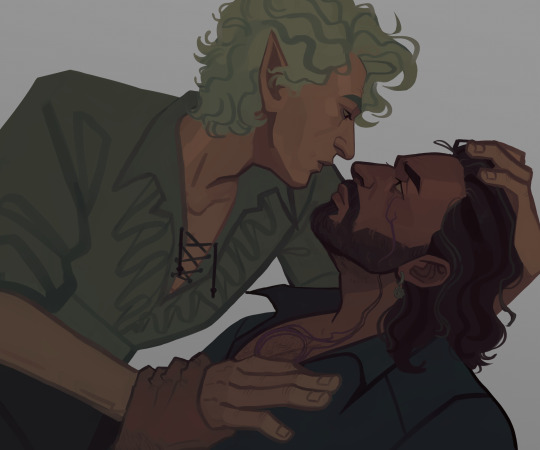
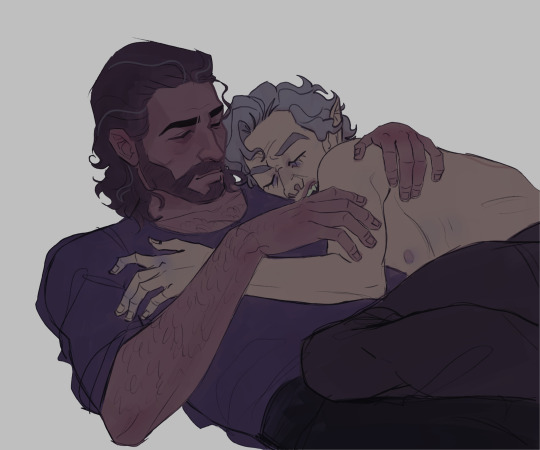
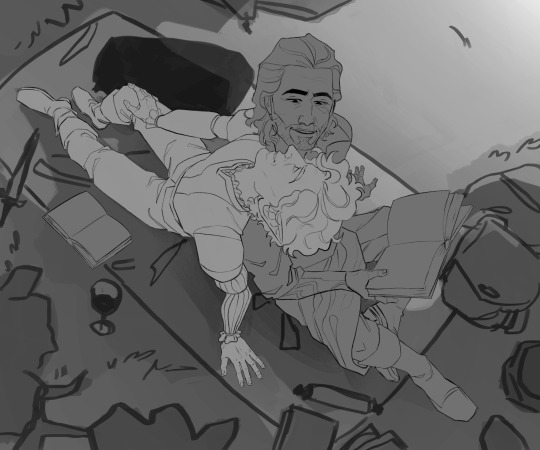
If you follow my main you had to know this was coming… anyway. Enjoy these bloodweave doodles :)
#bloodweave#gale x astarion#astarion x gale#baldur's gate 3#bg3#baldurs gate more like baldurs gay amirite folks?#yeah sorry the themes of hunger abuse and power got to me. I’m not immune to thematically mirrors#I have so many thoughts about the it’s not even funny anymore#oh you mean to tell me that canonically gale would offer up his blood if asked and that astarion can’t even do that bc of the orb ??#tasteful irony that the guy who would want to help can’t do that bc of a mistake he made for love.#especially devastating for someone who measures his self worth in usefulness#oh they are so fucked up and they could understand each other in ways hardly reachable to others#once I start an origin run it’s over for you guys I will be so insufferable. even more than usual
5K notes
·
View notes
Text
swimming upstream v2
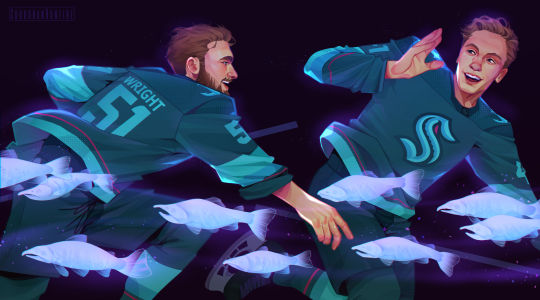
#super late but congrats for making it to the nhl full time boys!!!#theme song for this one was Me and Julio Down By The Schoolyard by Paul Simon#i also listened to The Obvious Child on repeat#but that one is less thematic#anyways SUPER glad to be done with this one#its been sitting around since the season started#and garth n wright have been doing so damn good its about time#sorry about the quality tumblr would not let me upload full res#seattle kraken#shane wright#ryker evans#fish#hockey#hockey art#nhl#my art
416 notes
·
View notes
Text

Turtle Takedown Teamwork.
[First] Prev <–-> Next
#poorly drawn mdzs#mdzs#wei wuxian#lan wangji#tulu xuanwu#Something about changing the action sequence to something gentle is hilarious to me.#The lesson here is “Be nice to turtles. They are gentle creatures. And many are very endangered.”#don't get me wrong here; I love this scene a lot. LWJ's string technique is one of my favoyrite things.#We do get a fair amount of LWJ fighting but I always loved how the theme of strings comes into play.#There is actually a lot to unpack with LWJ being associate with 'strings'.#The musicianship: Of dedication and rigor in one's practice.#The tension between following along a path or composing your own way forwards (playing what has been written vs composing)#A string is a tightly coiled/taunt entity; The same tension that makes it sing so beautifully can be it's downfall if pushed too hard.#And as a non-musical string - something that binds. Be it to his sect and family or how he binds his fate to WWX -#LWJ cannot exist without his binds. It is not something which ties him down though. It keeps him together.#And he himself *is* a bind. He 'ties wwx down' in ways that are initially negatively viewed ('come to gusu' - feels like: come be trapped)#But later it is shown how (despite being introduced as a free spirit) WWX truly wants to be bound to something and someone.#Marriage is a bind he wants. He wants to be tied and grounded by LWJ.#It's starting to sound like innuendo. Let's call his fondness for being literally tied up smart thematic writing.#Finally. Sex scenes that are important to the plot and characters
1K notes
·
View notes
Text
ds9 au where everything is the exact same but the vic fontaine holoprogram is a drag performer at a gay bar
168 notes
·
View notes
Text


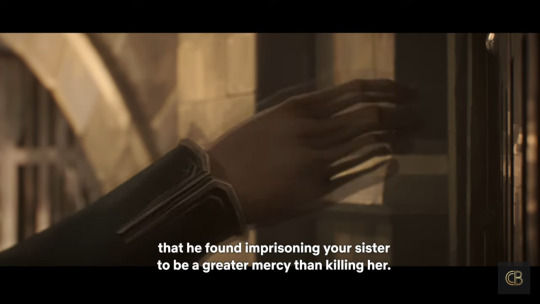
how is hallucination Silco more sympathetic to Vi’s prison trauma than the writers lmao
#guy who hates vi and tried to kill her nonstop has more empathy for her prison trauma than her enforcer gf#like how is THIS the only acknowledgment of VI’s trauma 😭#arcane critical#silco#arcane vi#vi#the season thinks if they just have random characters say out of character shit then it’s thematic work or acknowledging something#but then they do nothing to actually show this theme or conflict of explore it though the plot or character actions lmao#paracritical
148 notes
·
View notes
Text

Teen Titans #25

Teen Titans Lost Annual

The New Teen Titans (Vol. 1) #31

The Titans: Secret Files & Origins #2

The Batman Chronicles #7
Kyle: [Dick] Seems like a good guy. Donna: He's one of the best. - Green Lantern #81
#i was working on one project and then got sidetracked doing this one instead bc dick and donna priority duh#also yes there are other moments of dick comforting donna but i'm pretty sure you can see the theme w the ones i picked#we are thematic here on hood-ex.tumblr.com#Dick Grayson#Donna Troy#the bestiiiies
189 notes
·
View notes
Text
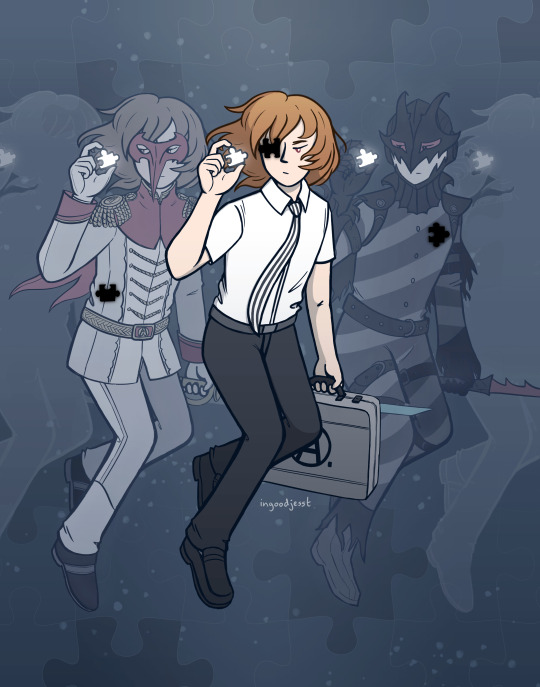
have you put the pieces together yet, detective
#goro akechi#akechi goro#persona 5#persona 5 royal#p5 akechi#p5 spoilers#persona 5 fanart#jesst some art#i may have worked on this for... just under two weeks? i had like. so many fckgin thoughts i might make a process/concept breakdown post#it's honestly just for my own peace (haha piece) of mind because i overthought about. SosoooOoOo many motifs and symbols and i just wanna#idk PUT EM ALL somewhere........ maybe it'll become its own jessay of mine. god. who can say.#also DUDE tumblr rly does crunch up quality wow ouch#unironically a core thematic inspiration for this piece is a quote from the folding ideas' video 'the nostalgia critic and the wall'#'it doesn't all make sense or resolve or coalesce because we don't all make sense'#'everyone is the illusion of order constructed brick by brick out of chaos'#i've watched that video essay through at least. a dozen times at this point. everything about it. yeah. it's good.#this piece initially went many different directions and i have realized ah yes to fully explore just THESE themes that i'm interested in as#they relate to goro akechi i will need to draw. at least two more pieces. sdlfhsdlkfjsd
647 notes
·
View notes
Text
There are people out there who genuinely think that the Starks aren’t thematically linked to ice in a way that is meaningful and central to the story? What?? I mean, never mind that they’re characterized as exclusively living in a frozen land, it is said that a Stark who goes south of the Neck melts. It’s not like their ancestral sword is called Ice. It’s not like they rule a castle called Winterfell. It’s not like their house words are “Winter is coming”. It’s not like their banner is a direwolf (a creature that is now synonymous with the snowy north) running on what is described as either snow or an ice-white background. It’s not like they are consistently characterized with having icy or cold demeanors to the point of it being a house trait (e.g., Benjen, Ned, Jon). It’s not like they ruled thousands of years as Kings of Winter. It’s not like the Starks, the wolves, are said to be uniquely suited to surviving winter. It’s not like a big part of their house legacy and how they even came to be is the construction of a giant ice Wall. It’s not like a key historical event in the last couple centuries is the Pact of Ice (Stark) and Fire (Targaryen). Apparently none of that matters 🙄 It’s so disingenuous to claim that any house with First Men blood would take on the role of ice. No, that’s a special characteristic given to the STARKS, and their connection with ice and winter and snow has thematic relevance.
#I think yall don’t like it because of the whole jon being ice + fire which is usually used in arguments of him being tptwp#and I won’t say too much on that particular point#but like did ppl skip that chapter where he has a prophetic dream of his destiny and is represented as both???#the duality of ice and fire is important and unique to jon-we don’t know what the ending will be but it’s important#the Starks are uniquely and thematically linked to ice and winter in a way that no other house is#and it is meaningful for jon to be both BECAUSE A CENTRAL THEME IN HIS ARC IS DUALITY!!#which often presents itself in his heart in conflict with itself like#house stark#asoiaf
170 notes
·
View notes
Text










You forgave Zubeia. Who do you think sent Runaan to kill Dad? But somehow, you got past that. / I'm going to forgive you. I don't know how, but I have to try.
4x03 / 7x09
#tdp ezran#ezran#zubeia#tdp#the dragon prince#eye motif#bc that's the seeing motif#theme: truth#a narrative of love#s4 s7 sister seasons#4x03#s4#7x09#s7#arc 3#4x03 my beloved!! thematic turning point of the whole show!! aah#runaan#god do i need a tag for runaan & ezran cause im tempted#personal fave#yes i cried
84 notes
·
View notes
Text




✧・°・。・°・。・ afterglow. - 2024.12.29
#infinity nikki#infinity valkariel styling#miraland collection#i adore this top so very much so i'm going to keep making variations of the same outfit with it#this version uses the cute hair flowers to go with the pigtails and my favorite eurekas that fit thematically too!#the afterglow eurekas are honestly my favorite with the rose and thorn theme that matches the aurosa set details#once i finish ranking up a set of 5 star eurekas per main stat#i'll start the recolor gambling for all the afterglow pieces#this is also my joyful fufu fit lol
73 notes
·
View notes
Text
I've remarked on this blog a few times before that I'm fond of the theory that The Shapeless One is Paracelsus, but I've always hesitated to elaborate, as I felt like there wasn't enough hard evidence that supported this theory being true. However, something recently clicked for me regarding one big parallel between them, and now I can't stop thinking about what that connection would mean for the story thematically.
In mémoire 61, after Machina pushes him to explain what his "plot" is, Teacher declares that he wants to achieve world peace. I've had no idea what to make of this line for a while now, just assuming that we'd need more context to understand what the actual hell he's talking about. But with the Paracelsus comparison, I feel like I'm starting to grasp what's going on there.
[This post needs a VnC-standard warning for mentions of suicide, sexual assault, and child abuse].
There are a few pieces of evidence that support the idea of Teacher being Paracelsus. VnC's Paracelsus is introduced as a great alchemist, just as he was in the real world, and the Count of Saint Germain was an alchemist as well. Nobody knows Teacher's origins, but he's one of the oldest vampires and close with the queen. There's also a little drawing of six-pointed stars that appears behind Paracelsus in the first storybook illustration of him, and those same stars are seen hanging from Teacher's walking stick in the scene where he first meets Noé.
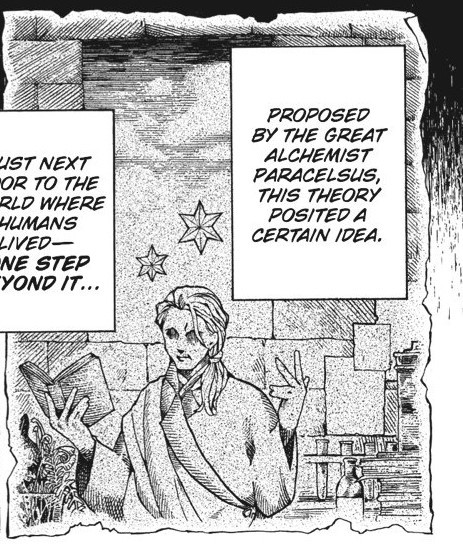
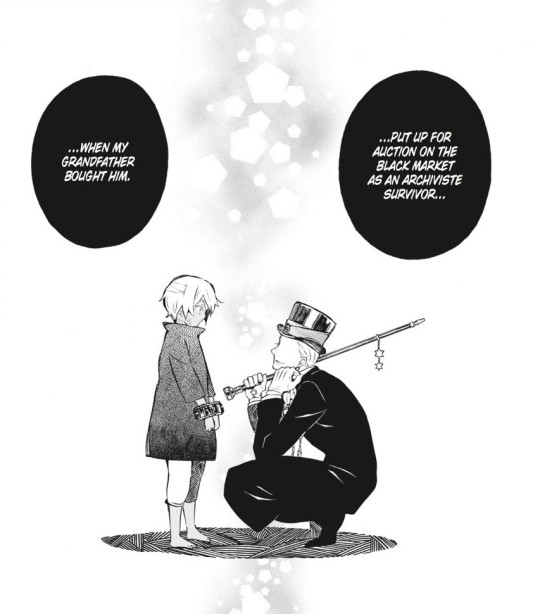
That panel of Teacher and Noé appears at the very end of chapter 6, and the Paracelsus panel appears at the start of chapter 7, meaning these images are quite conspicuously close together.
So what does this mean for Teacher's idea of "world peace"?
In the storybook version of Paracelsus's life, he's described as wanting to alter the world formula not for scientific curiosity, but because he wants to save the world.
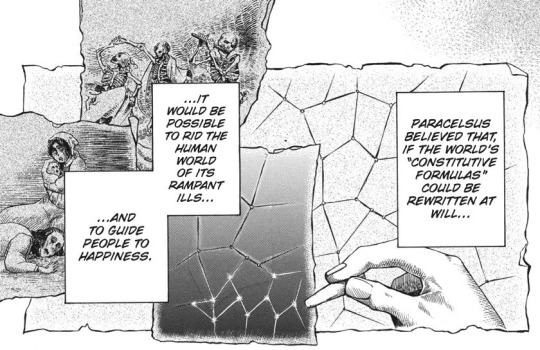
Paracelsus, per the childish version that Teacher presents to Noé, caused the Babel Incident because he was trying to "rid the world of its ills" and "guide people to happiness." The line about the human world's "rampant ills" is read over a drawing of dancing skeletons—a Danse Macabre. This is a Medieval way of drawing the personification of death, usually for the purpose of expressing the way that death comes comes for every person inevitably (the same theme later expressed by Vanitas art).
When Paracelsus speaks of the world's ills, this is the reality he seeks to cure. The world is afflicted with suffering and death, and he wants to rewrite the world's formula so that humanity can live happily without that pain.
A world rewritten to be without suffering—isn't that world peace? "World peace" is often used to evoke an end to armed conflict specifically, rather than suffering at large, but the concepts must overlap if they're pursued seriously. How can world peace last if there are people starving in famines or dying of disease? Suffering breeds violence. And how can someone seeking to alleviate "the world's ills" not want to achieve world peace?
If this is true, if Teacher's hope for "world peace" is him carrying on Paracelsus's legacy (or carrying on his own work, if they're the same man), then what does that mean for Paracelsus's supposed altruistic intentions?
We know little about Paracelsus now, only Teacher's recounting of the Babel Incident by way of a book he's reading to a child, but I think there are two ways to interpret what we do know.
Trying to rid the world of suffering is, on its face, the most noble possible intention. To lead the world to happiness is to attempt to help every other person in the world. And I can think of a lot of ways that Paracelsus's goals make absolute sense to me. If you discover that the fabric of reality can be rewritten, and you know that there are people in the world dying of famines, wouldn't you want to reshape the world so that they no longer have to go hungry?
It's possible, depending on what we find out about him in the future, that Paracelsus really will be a noble figure whose one great sin was hubris, and all he wanted from his research was to help the world in ways that make both moral and logical sense.
However, given some of VnC's other themes, I think there's another lens through which we should consider Paracelsus's actions. We don't know exactly what he was trying to rewrite with that disastrous experiment, but that Danse Macabre does give us one possible clue.
One of the themes that VnC has been slowly developing throughout its run is the idea that, though trying to save a person's life is noble, it is not noble to deny all death as a whole. This is a story about the concept of Vanitas, the idea that death is inevitable and that all else is rendered meaningless in its face. Noé feels like he failed Louis because he was unable to kill him when he asked, and it seems like the manga's being set up to end with Noé killing Vanitas to escape a fate Vanitas considers worse than death. One big part of what makes Mikhail so unsettling is his denial, his laughing about his mother's draining and the fact that he cannot accept the reality Luna has died, and Vanitas is horrified to hear that Misha is planning to resurrect their parent. That same issue goes on to be the one thing that finally drives a wedge between Noé and his teacher, as Noé can apparently forgive the man for purchasing him on the black market and killing Louis, but he's horrified to hear that Teacher told Mikhail that resurrecting Luna was possible.
All of these scenes have other elements to them, other things that drive the characters and inform why these specific ideas of undeath are so deeply horrifying to them, but the buildup of this running theme is an undercurrent through all of it. Vanitas means that someday all people must die, so what does it mean when somebody tries to deny that?
Even further, there's the broader horror of both Noé and Mikhail failing to process the bad things that happen to them. Misha commits blithe horrors in part because he does not understand that his sexual abuse was wrong, so he seems to see no problem with sexually assaulting others now in turn—as he does when he pressures Noé to drink his blood. Noé happily recounts being kidnapped and sold on the black market, remarks on Chloé and Jean-Jacques's goodness minutes after Chloé assaults him in his sleep, and brushes off the incident of Jean-Jacques drugging him to the extent that even Jean-Jacques himself is unnerved by it. All of that is deeply concerning behavior.
Misha is written to be obviously uncanny in his denial, and that uncanniness holds up a mirror to the subtler horror of Noé's own disconnects from reality. The more recent chapters have also begun drawing direct attention to the ways that Noé's denial of the bad in the world becomes problematic. The aforementioned scene of Vani, Dante, and JJ being disturbed by Noé's "it doesn't bother me" line does this, as does the long discussion Noé and Vanitas have about why Noé's ignorance of anti-Dham racism upsets Dante so much.
There is an ongoing tension in VnC between the inherent goodness of peace and life and the horror of what comes when those concepts are taken too far. Noé and Vanitas are this in a nutshell: an endlessly clashing duo made up of a too-extreme pessimist and a too-extreme optimist. The story arcs thus far have taken turns challenging each of their worldviews, slowly pushing Vanitas to open up and let himself hope for peaceful solutions, let himself accept love and emotional closeness, while also slowly pushing Noé to confront the fact that sometimes not everything has a happy-making peaceful solution after all. Sometimes "saving" a child means she has to die, and sometimes an enemy will have an entirely sympathetic reason to hate vampires, but Noé still has to fight them anyway to save the people he wants to save, regardless of whether that enemy is "right" or not.
Noé lives in denial of his own past traumas and his own present-day potential for harm. He denies the potential that "good" people he meets might harm him, and he struggles to accept instances where he has harmed others in turn. Dominique and Vanitas go on for pages after the amusement park about how reckless and overly trusting he can be, and he turns around, unable to cope, when confronted with the truth of what he did to Misha with his claws. However, Noé also has the benefit of his proximity to Vanitas knocking just a bit of sense into him, and it might not be a sure thing that he's going to stay in denial-land forever.
One of VnC's specific points of tension is the question of if/how Noé will grow to accept the hard things that currently bounce off his oblivious denial like water off of a raincoat. The end of mémoire 1, the statement that someday he's going to kill Vanitas, suggests that perhaps he might learn to understand how death, despite its pain, is important in its own right. It suggests that maybe he'll come around to no longer denying death and insisting that salvation is always its avoidance.
However, if he can't quite make that leap, the story provides us with dark mirrors to show us what a monster Noé could become by doubling down on his idealistic, optimistic denial. Misha's current state is Noé to an extreme, an innocent child committing horrors as he utterly fails to process the truth of his own horrific early childhood. Misha's driving motivation is a hatred of pain and suffering, and he's willing to do anything to resurrect the family that saved him from that pain in the past.
Then there's also Lord Ruthven, a man who was once an optimist in Noé's own mold, but has since broken bad in a spectacular way. Noé and Ruthven recite the exact same line about liking both humans and vampires, an obvious parallel, but now Ruthven is working with Naenia. Now he's living in the aftermath of his idealistic peace plan imploding and almost costing him his life. Ruthven despairs the last time he visits Gévaudan, lamenting the wrongness of his naive past hopes for understanding, and now he's working toward some unknown end involving Naenia, Charlatan, and the Queen. Now he's committing horrors of his own, biting at least three people by force, overriding their wills, and associating with the being that steals innocent people's true names.
There's also the question of what the hell Ruthven is doing with the queen. It seems he was somehow involved with Faustina devolving to her current state, and Loki references "smashing up her corpse," so it's possible Naenia's existence may be a sign that Ruthven wants or wanted her dead and/or cursed. However, the shots of him with the Faustina-like body in the tank at the end of mémoire 18 suggest there's a chance that he could instead be involved with some form of resurrection scheme (or a scheme to preserve/save her if she's not yet fully dead).
Ruthven exists in part to demonstrate the ways that an idealist like Noé can go bad, and it's possible that he, like Misha, is attempting some sort of awful resurrection, once again denying the reality of death.
Then, finally, there's one more character with whom Noé has these sorts of obvious parallels. The man who, perhaps, is also meant to represent what Noé could become if the dangerous sides of his optimism aren't reigned in: his teacher.
Noé is fascinated by Vanitas, drawn to him out of care and connection, but also because he wants to observe and understand him to sate his curiosity. In a darker mirror of the same trend, we see Noé's teacher allow Louis, Noé, Domi, and Misha to come to harm at least in part for the simple enjoyment of seeing how they react when placed in dark new situations. Noé and his teacher are also the only crimson vampires we know of who find the Blue Moon beautiful and alluring, rather than a source of fear (assuming that Teacher is a normal crimson vampire).
Noé was raised by this man; his worldview has been shaped by him in countless ways big and small. Noé was already living in cheerful rejection of trauma before The Shapeless One found him, but he could not have remained so radically detached from the painful parts of the world around him if his teacher had not wanted and allowed him to do so. He censored Lord Ruthven out of Noé's education, and he apparently did the same with anything that discussed (or expressed) severe bigotry toward Dhampirs. How else did Teacher shape him, and to what goal?
We know that the Shapeless One taught Noé how to fight. Given that "world peace" line, I wonder if perhaps he may also have taught him his morals on wanting to avoid conflict.
Teacher is a contradiction. He talks about "world peace," but he blithely leads Louis to his doom and supposedly doesn't hesitate to half-kill anyone who calls him by the wrong name. Marquis Machina calls him an incomprehensible natural disaster for this reason. Yet, despite all his rampant cruelty, I'm beginning to think that he might be just as much of a dangerous optimist as his student.
Teacher is defined by the fact that, in every scene, he always seems to look like he's having fun. There's hardly been a single panel where he's not drawn smiling. Sometimes that fun is vicious, a cruel smile made as a threat to Vanitas when he fails to address him by his name, but just as often, his aura seems horrifically innocent. He's just a man with a sweet smile and rather dull eyes having a very good time with life.
In the past I've largely looked at this smile as an extension of Teacher's sadism. He toys with Louis and Noé for the fun of it, and I took his smile as an expression of his cruel enjoyment of the pain he creates in his wake. However, now that we've seen him interact with Machina, now that we've observed him speaking casually with a peer for an extended period, there seems to be a disturbingly sincere quality to him as well.

Based on how he's portrayed in mémoire 61, when Teacher says he does everything he does for the sake of "world peace," I honestly think I believe him. I don't believe that he's not a villain—I can't guarantee that his vision of "world peace" would even align with a normal person's definition of "peace" or "happiness," but I believe that he's speaking some version of honestly here.
There's an honest to goodness optimism in that ever-present smile. There's a hope and a genuine quality to what he announces to Machina, in contrast to his smiles of sweetly cruel schadenfreude.
So perhaps, if all that is true, if Teacher is another dark mirror to Noé and he really does want to bring about world peace, then the point of him is that "world peace" has the potential to be a horror. What is the pursuit of world peace if not the ultimate pipe dream of every idealist in the mold of Noé and Ruthven? And what is VnC if not a long catalog of the horrors that idealists can bring about if they aren't careful?
And that, finally, brings me back to Paracelsus and the Danse Macabre.
Depending on what Paracelsus wanted to achieve through his experiments, it's possible he may have been yet another character trying to escape the harsh reality of death. The line about the world's "rampant ills" is placed over the Danse Macabre, after all—a symbol of death's universal inevitability. Is that the painful ill that Paracelsus wanted to address by rewriting the world formula? Inescapable death itself?
If so, Paracelsus becomes the ultimate embodiment of what happens when one denies death's certainty and the necessity of that certainty. He's the ultimate denial of "Vanitas" and what it represents on a scale far larger than Noé, Misha, or even Ruthven could grasp. And the manga casts his failed experiment as a Tower of Babel, throwing the world into chaos and causing countless deaths in his failure's wake.
Meanwhile, Teacher seems to have some ideas about how to cheat death in the present day, as he's promised Misha that there's a way to bring "The Vampire of the Blue Moon" back to life. This could be a lie, of course, or he could be planning to bring back "the vampire of the blue moon" in a way that does not actually bring back Luna as an individual. However, even trying to bring back the Blue Moon in some other way, perhaps through the human Vanitas, still represents him trying to restore something he found beautiful that was lost because of death. It still ties him thematically to the perversion of death as an ending, the same as Mikhail and Ruthven.
So far every character we've seen that wants to undo death is cast as an antagonist. Ruthven, Mikhail, and The Shapeless One are all united by a cruelty and a perverseness in various forms, and their goal is part of this. Death is a tragedy, but although trying to save the lives of people who want to live is noble, attempting to undo or eternally escape death is a far worse horror.
If Teacher is Paracelsus, or if they're closely connected in some other way, then that serves to further this point and show how the horror of escaping death extends to Paracelsus as it does the others. Teacher is strange and cruel. Paracelsus might be a nobly hubristic historical fool in a storybook, but if these two characters are connected, that instantly reveals the unsettling truth of how wrong Paracelsus's potential attempt to thwart death would have been. Nothing Teacher is working for can be wholly good.
And, just as Noé and Misha's denial is both present and harmful beyond the most severe subject of death, even if Paracelsus wasn't trying to craft a world without death by altering the world formula, we know he was trying to create a world without suffering. Again, this is a noble goal in theory, but so long as death remains, some suffering will remain as well. Crafting a world without pain and suffering can also go much too far, can slip into denial and cruelty. Mikhail's whole motivation as an antagonist is his search for a life without pain, and look where that's led him.
A rejection of all suffering can be an extremely dangerous thing, whether it's running from one's own mental pain or wanting to rewrite the world to negate all suffering as a whole. This dream will never not be a detachment from reality.
The Case Study of Vanitas is a series that seems to be searching for a balance of optimism and pessimism, a way to approach the harsh realities of life that lies between the toxic extremes embodied by Vanitas and Noé. To lapse too far into hopeless pessimism creates a Vanitas, a Chloé, an Astolfo. It creates people who are suicidal, genocidal, or both, and dangerous to themselves and others for it. However, to go through life in a state of eternal joy without processing one's pain, or to attempt to create a world wholly free of suffering—that is just as dangerous and foolish. What are Noé, Misha, and Ruthven if not dangers to themselves and others? What is Teacher if not the most dangerous man in this manga?
Noé and Misha are unsettling because they smile through the bad things that happen to them and act as though they aren't bad. They each have some exceptions to this rule—Louis's death for Noé and the pain suffered at the hands of Moreau for Misha—but they still come across as at times disconnected from the reality of pain.
Yet, neither of them is as disconnected from the reality of pain as a man that can behead the grandson he raised with a smile on his face. Noé as a child sees the fun in being kidnapped and put up for auction. Teacher, if his smile is to be believed, sees the fun in every single thing we've seen him do, and that's what's so unsettling about him. He genuinely seems to be having a good time, including and especially when he's blithely committing horrors for the fun of it.
Noé and Misha's strange behavior stems from trauma, and we don't know that's the case for Teacher. Perhaps not, as he seems much colder and crueler in his tendencies than either of them. But either way, the happy sincerity displayed by both of them is echoed in the face of the Count of Saint Germain as he tells Machina that he's searching for world peace. That is the face of someone idealistic, someone who believes he's working toward a real goal that both justifies and delights him.
Teacher wants world peace, and his warped nature means that we have no real idea what "world peace" means to him. Is a world at peace a world where he still gets to violently beat people who get his name wrong? A world where he still gets to have fun observing the free will and choices of the traumatized children he raises? Maybe he once believed in a world that was truly without suffering, and his overly-long life and mad optimism have eroded his tether to reality, turning him into the awful person we see now. Maybe the catastrophe of the Babel incident broke him and turned him from a hubristic idealist to warped echo of his former self. Maybe he somehow thinks all the suffering he causes is justified if it's in pursuit of his noble end goal. Maybe his version of "world peace" is a world where all people can live free from the fear of death, and the smaller pains caused along the way are irrelevant in the face of that impossible dream.
Or maybe he's just a cruel hypocrite.
In the end, we still know too little about both Paracelsus and Teacher to make any grand proclamations about the truth of their characters. However, I can't unsee this connection between them now that I've seen it. Teacher is one of Noé's dark mirrors, a character that represents the horrors possible when one goes too far down his current emotional path. Noé is optimistic to a fault, convincing himself to see only the best in many truly awful scenarios, and Teacher is the man with an eternal smile printed on his face. Noé loves and wants to save Vanitas, and Teacher speaks of the Blue Moon's ultimate beauty and says he has a way to bring them back to life now that they're dead. Noé is the eternal savior, always desperate to prevent people from dying, and Teacher claims that everything he does is done in the name of achieving world peace.
Similarly, Paracelsus is defined by throwing the world into chaos and horror due to his over-optimism. He tried to go too far, tried to rid humanity of its countless ills and create his own form of world peace, perhaps even tried to rewrite the reality of death. Did he hate pain and cold like Misha? Did he want to stop unjust wars like Ruthven? Did he want to become a savior in the image of Noah?
If Teacher's goal of "world peace" is to be believed, then whether or not Teacher and Paracelsus are actually the same person, they represent the same thematic extreme. Death is inevitable, says the concept of Vanitas. It's inevitable and Noé must learn to accept that fact before he does something awful in the name of pain and death's prevention. Teacher and Paracelsus have both done something(s) awful in the name of pain and death's prevention. Teacher and Paracelsus have followed Noé's path of optimism to such an extent that they, in one way or another, both claim(ed) to want to save the world, and this requires a mad extreme of Noé-like cognitive dissonance and hubris.
Paracelsus pursued some goal, some way of granting humanity happiness that was supposedly noble but still murky in its specifics, and he warped the fabric of reality and caused the countless disasters of the Babel Incident in the process. And that's assuming the storybook is true, and Babel really was accidental on his part. Meanwhile Teacher has warped the seemingly noble dream of world peace into something that he can claim is served by the way he's tormented Louis, Misha, and Noé. There's a chance that both men tried or are trying to undo the reality of death. They're bound by the same underlying current of scientific curiosity intermingled with their dreams of world peace.
Noé is not an alchemist, and he's not particularly skilled at rewriting the world formula. He's unlikely to have any chance to rewrite the fabric of reality itself for the better. He's unlikely to have any chance to achieve "world peace" by any definition.
Noé is, however, a dangerous optimist who has not yet learned that death is unavoidable. He hasn't yet learned that death can be preferred to its alternatives. And he was raised by a man who seems like he has not learned or does not care that disrupting Death in the grand sense will inevitably lead to horror. Or perhaps a man who enjoys horrors and wants to toy with absolute death as a part of that. And all this in a world warped and defined by the folly of a man who may also not have understood the horror of evading death.
So Teacher might be Paracelsus. I think this connection between them only strengthens the odds of that theory being true. But even if he isn't, they represent a similar thing for Noé and for the manga's themes at large. You cannot rid the world of the Danse Macabre, and attempting to end that dance will only bring greater ills and greater pain than death on its own could ever hope to bring.
A strange and dangerous man proclaiming with an honest smile that he wants to bring about world peace does not make him any less strange or dangerous. Depending on his definition of world peace and his idea of death's place in it, that idealistic goal may actually make him far more dangerous than if he were nothing more than a simple sadist.
#I've talked at length about some of these ideas in other posts before#but putting this together felt like finally being able to marry a few different major themes I've written about#that have stayed largely disparate up to this point#also huge shoutout to the several other theorists I've seen point out the thing with teacher and paracelsus and the stars#that's such a cool detail#ANYWAY this is more of a reach than what I'd usually stake a whole meta essay on. but I feel like my thematic foundations are sound#vnc#vanitas no carte#the case study of vanitas#teacher#vnc teacher#the shapeless one#comte de saint germain#vnc paracelsus#teacher my beloathed#noé archiviste#theory#english major hours#vnc spoilers
81 notes
·
View notes
Text
I've been following @druidposting's DR2 playthrough on discord and we just had a really good discussion about DR's Closing Arguments. Specifically the way the murderer is depicted as grey and featureless, which until now I found a bit annoying.
In Danganronpa it's repeatedly the case that we don't have the full picture until the talking actually stops- which always goes beyond the end of the trial. We generally vote first and come to understand what the murderer's actual motive was, sometimes filling in important pieces of the timeline in the process, afterwards.
But none of that matters for the killing game because characters' emotions aren't directly relevant to who was the 'blackened'- the only thing that matters to Monokuma- so it comes out afterwards and does nothing to change their execution. It doesn't matter how sympathetic they are (basically everyone) or whether other people share responsibility for the situation (eg. Hanamura, Pekoyama, Momota) or whether they intended to murder at all (Nanami). They objectively pulled the trigger and nothing else matters. Nothing about them as a person matters.
The Closing Argument mechanic might illustrate that problem- literally. They're a dramatic, conclusive summary of the entire case... constructed before the vote even happens, before we know if we're actually right, and they're missing something really important:

The actual perpetrator.
We quite literally don't even begin to see the real person behind the crime, any real exploration of their mental state, anything besides the cold, hard facts of the murder that are necessary to convict them, until the comic finishes and the protagonist makes their final accusation- replacing the grey figure with their real appearance in a shot that's often intensely emotional.
And these comics lack crucial parts of the case's timeline and sometimes important parts of the very scenes they depict that we only find out about afterwards. And those are what we know; characters may die with some pieces of the truth and prevent us from ever learning them. These aren't objective depictions of the murder, they're the protagonist's subjective attempt to connect the facts they have. A join-the-dots portrait of someone with missing dots and no colour.
Even characters' expressions may not match how they truly feel, with the grey placeholder potentially looking way more confident and sinister than they were in reality. Pasting Falter's commentary here since they put it well.

For obvious reasons this could especially be a problem for characters that die before the trial- the ones we never get a post-vote testimony from. DR1 chapter 4 really highlighted that in the way Asahina's huge misinterpretation of Oogami's feelings took up a lot of the post-trial discussion, only for Monokuma to reveal Oogami's real suicide note and recontextualise everything.
It might really be a problem for how Komaeda's depicted in DR2 chapter 5. While he isn't greyed out, we get panel after panel where he's either level-headed or maniacally evil, and even the depictions of his self-torture and death don't humanise him:





But we know that his real feelings were more complicated than that. We have his actual corpse to compare the last page to.
He died afraid.

If we approach the comic as Hinata's mental image of him instead of reality, he died without anyone truly understanding him. He was alarming, very hard to relate to, actively fought against people doing so, ensured even the killer didn't watch him die, and the survivors couldn't begin to understand his motive until a chapter later. The Closing Argument reflects that.
Early in DR1 Togami calls out the rest of his class for judging others by their own standards. However, he, too, is doing this, maybe more so than many other characters; his inability to view other people through anything but the cold, brutal logic of the killing game bites him in the ass in chapter 4. In DR2 chapter 2 voting without a good understanding of Pekoyama's motive or Kuzuryuu's involvement nearly got everyone killed. Komaeda's a walking embodiment of the problems with flattening people into caricatures and not empathising with them, suffered from people doing that back to him, and his case- the Closing Argument for which turned everyone else into grey placeholders- was impossible to solve with objective facts. It was only survivable because the survivors cooperated and one person tried to analyse things the way he would.
The games have always been a critique of the justice system and Japanese society and push us to care about others as individuals, not reduce them to- and judge their right to exist by- something they've done or their net impact on society. There are always consequences when someone neglects to do that, and the above might be yet another way the games explore that theme.
#danganronpa#dr analysis#komaedology#komaeda#.txt#sorry @ non komaedaheads for making it about komaeda again LMAO#that was not the intention initially he's just... a really good exploration of this#and i think about his expressions in that comic vs his corpse and what we retroactively knew he was dealing with a lot#btw don't send spoilers to falter please!! i'm @ing to credit them- this was a discussion not solely my ideas- but they are not done yet#and aren't reading this post until they're caught up for obvious reasons#this came from discussing ch2 since the incomplete picture people voted with nearly killed them#(btw don't @ me about komaeda's description in the second-last paragraph being an oversimplification; i know :p )#(he has nuance- especially outside of the killing game- but i'm just focusing on the thematically relevant broad strokes here)#(eg. i feel like he demonstrates empathy sometimes but kodaka has said that lack of ability to empathise/be empathised with#is a theme for him- and the ways he's been proactive in the killing game consistently lacked regard for others' feelings/individuality#reducing them to interchangeable Ultimates(TM) instead. it's partly why he self-destructed while everyone else#was able to forgive themself and keep moving forwards imo. your worth being defined rigidly by objective contributions to society#does not mesh well with the idea of rehabilitating people who've destroyed the world before they could even start to improve it#and even if he did give them a chance at surviving he still succumbed to his own ideology in the end#killed himself for 'hope' and to be 'important' like he 'wanted' but died terrified and in pain and alone instead of fulfilled#man i wish 2.5's ending/postnwp canon in general dug into that ;-; )#ANYWAY ty for reading all that. i feel like i rambled a lot in this one. i have a headache now ghdkjsfgdsf
67 notes
·
View notes